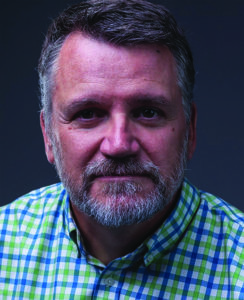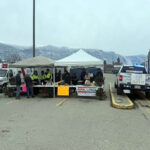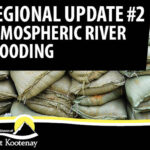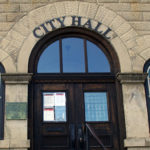Home »

RDEK Galloway Lands bylaw amendments adopted
An impassioned plea by City of Fernie Mayor Nic Milligan to fellow Regional District of East Kootenay (RDEK) board directors to vote against the proposed Galloway Lands project fell on mostly deaf ears July 14.
The board voted nine to five in favour of adopting Bylaws No. 3213 and 3214, which amend the Elk Valley Official Community Plan and Elk Valley Zoning Bylaw to rezone multiple properties known as the Galloway Lands in Electoral Area A, permitting increased residential development on the properties adjacent to Fernie Alpine Resort and the City of Fernie.
Prior to the vote, Mayor Milligan asked fellow board members to reconsider their positions.
He referenced Sea-to-Sky Gondola manager and Tourism Squamish chair Kirby Brown who spoke in Fernie in the fall of 2022.

“He warned the City of Fernie, and by extension this region, that the changes they’ve seen that is making development so difficult to live, work and settle in Squamish, is coming here. And it’s not just coming to Fernie. It’s coming regionally, because it pushes people outward.
“As I said last time, it’s happening in mountain towns across the continent. The people who support the local economy – the services workers, nurses, teachers can no longer afford to live in those towns and they’re forced to commute and it pushes further and further out as property values increase,” Milligan stated.
“One of the things Kirby Brown suggested that we do, that they do for the Sea-to-Sky, is work with the Indigenous communities. Use that model and don’t just think about short-term economic gain; think about your children and your children’s children – the future of your community. This is going to change our region; this is the beginning of something that’s going to change this region forever.
“It will have an impact for generations. It’s an important crossroads. Make your decisions here very seriously,” he urged, adding, “We took it to a public hearing. I appreciate that as it is part of our democratic process. We need to do that; we need to hear people and then we absolutely, collectively ignore that feedback. We minimize the input. We said ‘only those opposed come out.’ That’s part of our process. If we don’t want it, don’t do it! Let’s get rid if that process. If we’re not going to listen to people, let’s stop doing that.
“Just at this meeting, we amended our strategic plan to maintain the rural character of our region. This doesn’t do that. These are exclusive estate lots that we’re talking about. This is not in rural character. We’re creating this cognitive dissonance. We’re telling the people we represent we’re doing one thing and then we’re doing something completely different.
 “Let’s not squander our rural context, let’s not squander our natural assets. Let’s focus on those things that make life living here good. And then we’ll continue to draw visitors and people in a way that sustains our community and then maintains an authentic sense of place that we have built.
“Let’s not squander our rural context, let’s not squander our natural assets. Let’s focus on those things that make life living here good. And then we’ll continue to draw visitors and people in a way that sustains our community and then maintains an authentic sense of place that we have built.
“You can’t use the same development model over and over again and expecting it to change. They just don’t change; they move in one direction and once these things are gone they don’t come back. If we change the character of this place, it’s not changing back. It’s going to go in one direction.”
Electoral Area B Director Stan Doehle told the board he attended the public hearing “and the vast majority of people spoke against it and they’re not just out there complaining. I knew over half of them and have full respect for those people and they give us the numbers that supports the communities don’t want this and yet as a board we figure we know better; we don’t. In all fairness, the way this regional district governs, that that’s a big thing, it’s huge that we don’t listen to the people. We might not like what people have to say but at the end of the day, the people are the ones who put us in here. So if we don’t listen to the people, we’ve got serious problems.”
Electoral Area A Director Thomas McDonald in turn urged the board to support passing the bylaws.
Regarding public hearings, he said, “I do think they’re extremely important and it is important to understand that a public hearing is not a referendum, it’s one piece of the puzzle. It’s important to have that venue and for people to know their voices matter. However, there are many factors that are taken into consideration when determining how we will vote on a matter.
“In this case, I felt the current proposal provides a balance between the opportunity for development, access to the land for this generation and many to come and environmental protections, including many of the concerns raised by the public and that is why I voted in favour for this.”
Directors McDonald, Jane Walter (Electoral Area E), David Wilks (District of Sparwood), Susan Clovechok (Electoral Area F), Mark Doherty (Village of Canal Flats), Mike Gray (Village of Radium Hot Springs), Don McCormick (City of Kimberley), Roberta Schnider (Electoral Area G) and Rob Gay (Electoral Area C) voted in favour.
Directors Milligan, Doehle, Norma Blissett and Wayne Price (City of Cranbrook), and Al Miller (District of Invermere) were opposed.
District of Elkford Mayor Steve Fairbairn was absent.
“This proposal was one that all of us as directors took a great deal of time to review and to consider. Most of our directors attended either one or both nights of the two-night public hearing and we are deeply appreciative of all those who contributed their input both informally over the past several months and formally through public hearing process. This was not an easy decision. Although there continue to be differing opinions, it speaks to the character of our Board that these discussions have remained respectful and professional,” stated RDEK Board Chair Rob Gay.
The bylaws received third reading in May and had been awaiting approval from the Ministry of Transportation and Infrastructure before coming back to the RDEK Board for consideration and adoption on Friday.
The required development agreements have been finalized and the next step in the process will be for the developer to apply for subdivision to create the conservation / recreation parcel on the properties.
Ian Cobb/e-KNOW







